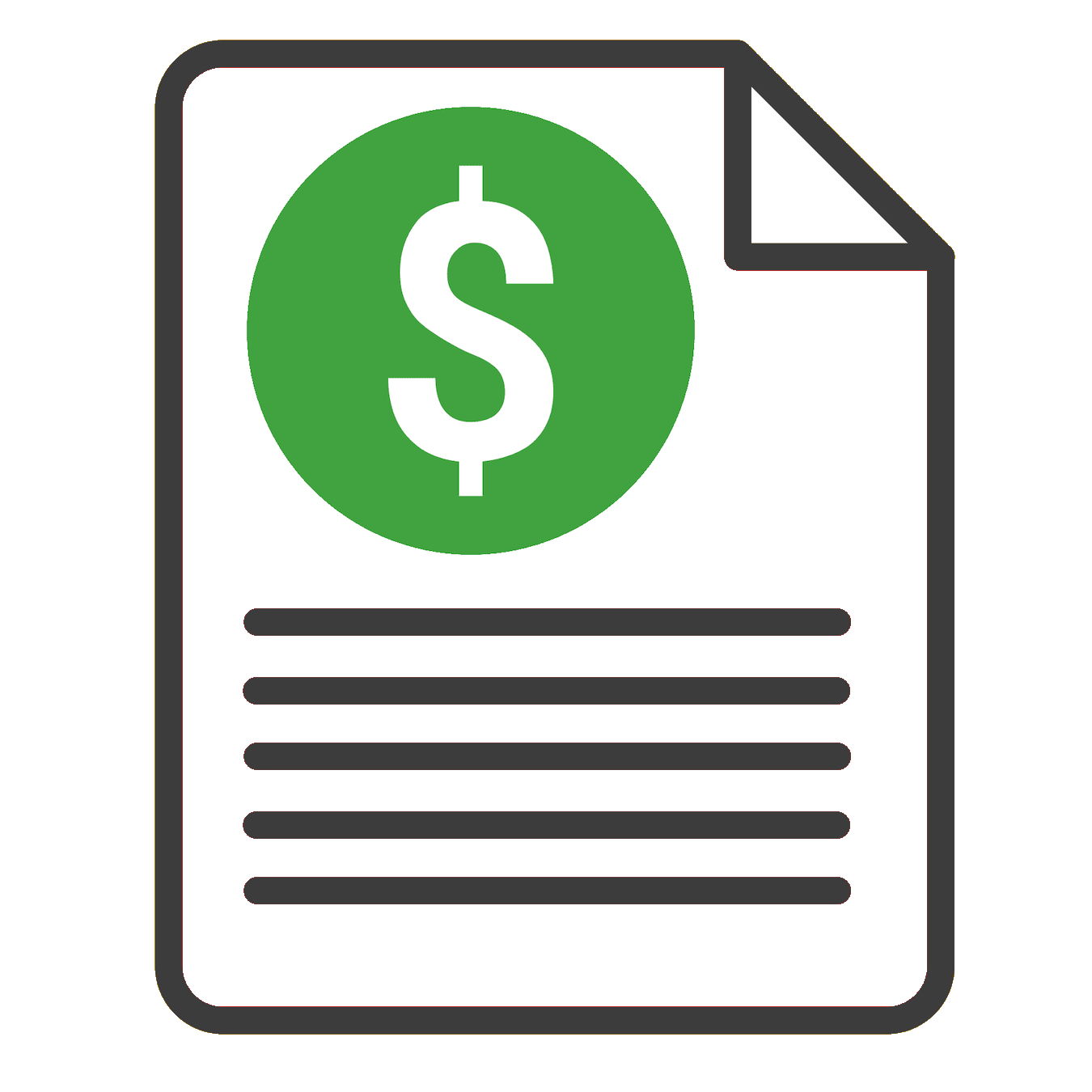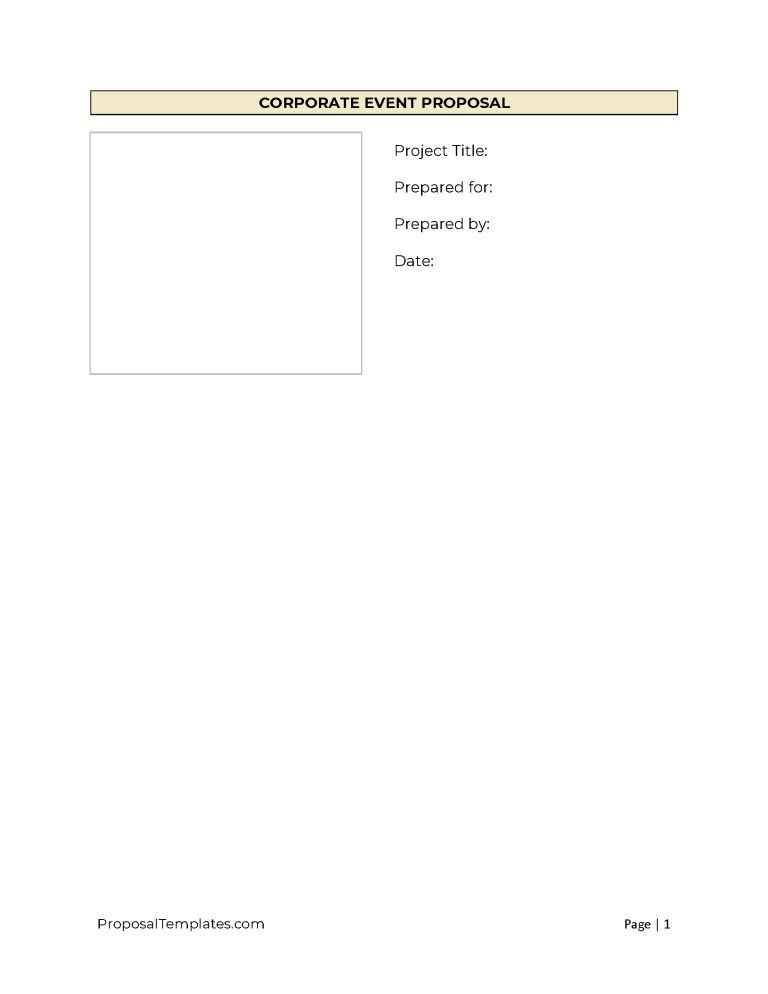A corporate event proposal is generated by event planners and then sent to corporations intent on hosting an event. Generally, every bid should discuss the event planner’s venue channels, service logistics, and rates with the client’s needs.
Types Of Corporate Event Proposals (13)
- Charity/Fundraising Event – Proposals discussing a cause and marketing strategy since event support or sponsorship is sought.
- Conference – A proposal geared for conference, symposium, and seminar clients, therefore focusing on venue logistics and agendas.
- Employee Appreciation – This proposal approaches businesses hosting employee events and thus focuses on strategies such as audience engagement.
- Event Marketing – This proposal approaches event planners requiring marketing plans, therefore featuring a marketer’s advertising channels and strategies.
- Event Management – Proposals promoting an event manager’s expertise in planning functions such as venue coordination and logistics.
- Event Photography/Videography – Proposals sent by media service providers (i.e., Photographers) to event planners featuring the photographer’s rates and deliverables.
- Holiday Party – A proposal showcasing the provider’s party-planning approach, therefore discussing catering, venues, and budget strategies.
- Incentive Travel – Proposals appealing to clients promising travel and presenting substantial travel arrangements and themes sections accordingly.
- Product Launch – A proposal featuring the provider’s marketing strategies and overall presentation skills for clients unveiling new products.
- Sponsorship Proposal – A proposal seeking sponsorship while explaining its benefits, levels, and advertising potential.
- Team-Building Event – Proposals approaching clients with techniques specifically geared to improving the interrelations of a client’s team.
- Trade Show – This proposal focuses on designing and implementing exhibit materials (i.e., booths) to attract exhibitors.
- Training and Workshop – When a company wants to organize training sessions or workshops, this proposal outlines the content, trainers, logistics, and materials required.
1. Corporate Event Proposal Cover Page
Present the event planner’s business name, address, and contact numbers in a particularly sleek design. Additionally, display the planner’s logo and online information with the proposal.
- Proposal Title, Graphics
- Event Planner’s Name, Logo, Contact
Client’s Information, Logo
- Submission Date, Author
- Slogan, Taglines, Quotes
2. Formal Title Page
Present the title of the corporate event using a design theme that complies with the overall proposal design. Also, include the date and location of the event’s name along with the sender (event planner) and recipient’s information.
Event Title, Date, Location
Sender/Event Planner’s Name, Logo, Contact Information
Proposal Title, Author, Submission Date, Expiration Date
Logo, Design, Slogans
Relevant Contact Information
3. Table Of Contents
Enable the client to conveniently navigate this proposal by composing a table of contents while keeping the design within the proposal’s character. List every topic separately (i.e., ‘Event Overview’) with a corresponding page number.
Executive Summary, Introduction, Objectives, Concept
Event Details, Budget, Marketing, Promotion
Logistics, Operations, Event Program, Activities
Sponsorship Opportunities, Testimonials
References, Conclusion, Appendices
4. Executive Overview
Spell out the purpose of the proposal by generally discussing its topics in relation to the client’s needs. For example, when discussing their past efforts, bring up solutions the event planner can apply to their goals.
Event Title, Date Purpose, Highlights
Purpose, Venue, Audience
Theme, Benefits, Technical Requirements
Budget, Scheduling, Staffing
Contact Information, Call To Action
5. Introduction To Corporate Event Proposal
Bring together a history of the event planner with an overall discussion of the company. Do so with the purpose of showing the event planner’s goals are aligned with the client.
Header Information, Basic Introduction/Greeting
Background Information, Client Needs
Goal Alignment
Customized Discussion
Visual Elements, Key Benefits
6. Corporate Client Needs
Put forth a summary of the corporate client’s objectives while demonstrating an apparent camaraderie with their organization. Generally, the client must feel that the event planner understands their goals and can solve them.
- Client’s Objective, Event Purpose
- Target Audience, Alignment with Client Values
- Client’ Vision, Technical Requirements
- Financial Considerations, Legal Compliance
- Event Timing, Additional Client Comments
7. Corporate Event Overview
Describe the event to the client by discussing its theme, marketing opportunities, decor, logistics, and budget accordingly. For example, explain how the event planner’s audio/visual plans will increase audience engagement.
- Event Title, Theme, Date, Time, Venue, Agenda
Safety, Sustainability, Registration, Ticketing
- Format, Event Flow, Catering, Food Service
- Decor, Design, Entertainment Activities
- Technical Setups, Logistics, Transportation
8. Corporate Event Timeline
Discuss the event costs, expenses, and estimated total comparatively with the client’s goals and budget. It is important that the client understands the event planner’s intent of respecting their budget and financial concerns.
- Budget Summary, Revenue Projections
Expense Breakdown, Budget Assumptions
- Justifications, Cost Control Measures
- Return on Investment (ROI)
- Payment Terms, Schedule, Direct To Appendix
9. Corporate Event Services
Present the event deliverables in detail through a discussion on how each will be developed, supplied, and furnished to the client. For example, explain how the event planner will promptly provide promotional materials.
- Event Planning, Coordination, Client Communication
- Venue Selection, Management, Security, Safety
- Logistics, Operations, Branding, Design Services
- Catering, Food Services, Registration, Ticketing Services
- Audio-Visual Technical Services, Marketing, Post-Event Services
10. Event Program
Impress the client with the program’s agenda together the flow of events from setup to breakdown. In essence, the event planner’s calendar should impress the corporate client with its detail and scheduling.
Pre-Event Planning, Concept Inception
Venue Selection/Booking, Branding
PR, Speaker Arrangements, Performance Preparations
Event Day Schedule, Post-Event Activities
- Contingency Plans, Final Wrap-Up, Contact Information
11. Venue Selection
Spell out the reasoning behind the chosen venue by discussing both its benefits as well as its challenges. Build venue confidence by assuring the client that it is an appropriate and preferable facility for corporate-centered activities.
- Venue Criteria, Venue Research, Site Visit Information
- Venue Options, Rationale, Location, Accessibility
- Venue Capacity, Facilities, Amenities
- Technical Capabilities, Cost, Budget
- Terms, Conditions, Backup Plan, Client Input
12. Corporate Event Theme
Detail the event’s audience engagement strategy that will engage attendees through its visuals and overall theme. For instance, describe how the event branding will help the client achieve their corporate goals.
- Event Theme, Design Elements, Client Input
- Branding Integration, Logo, Visual Identity
- Event Collateral, Decor, Setup, Audio-Visual Presentations
Interactive Elements, Event Signage, Cost Budget
- Event Materials Production, Sustainability Considerations
13. Marketing And Promotion
Specifically, explain to the corporate client as to how the event planner’s marketing strategy will impress the target audience. For example, clearly describe the event planner’s content strategies for social media and email marketing.
- Marketing Objectives, Target Audience, Registration
- Marketing Channels, Content Strategy, Evaluation
Branding, Visual Identity, Timeline, Content Creation
- Social Media Strategy, Sponsor Promotions
- Paid Advertising, Public Relations, Media Coverage
14. Logistics For Corporate Event
Break down the event tasks while pointing out key steps and potential risks. Assure the client that the logistic planning will answer their needs for the event as well as remain within budget.
- Event Staff, Team, Registration, Check-Ins, Distributables
Project Timeline, Vendor, Supplier Management, Parking
Logistical Plan, Technical Setups, Contingency Plans
- Venue Setup, Layout, Signage, Wayfinding, Transportation
Accessibility, Accommodations, Security, Safety, Catering
15. Corporate Event Team And Staffing
Write an introduction to the corporate event planning team so that the client may review their roles. That is, identify everyone directly involved with the day of activities and both the preparation and post-event service.
- Team Member Names, Titles
- Roles, Responsibilities, Qualifications
- Experience, Team Leader, Commitment
- Supporting Staff, Vendors
- Communication, Coordination
16. Testimonials, References, And Qualifications
Build the event planner’s credibility with direct references because past success stories may inspire the client or sponsor. Additionally, display direct quotes from previous satisfied clients.
Client Testimonials, Success Stories
Client References, Privacy Statement, Client Contacts
Case Studies, Photos, Video, Online Material
Awards, Public Recognition, Recommendations
Formal Affiliations, Certificates/Permits, Team Contact
17. Pricing And Terms
Display the corporate event’s estimated totals, pricing structure, package options, and payment terms in detail. Present each expense or fee whether or not it is directly generated by the event planner (i.e., third-party fees).
Itemized Pricing, Cost Estimates, Total Cost
Payment Schedule, Payment Methods
Discounts, Incentives, Additional Costs, Taxes, Fees
Late Payment Policy, Cancellations, Refund Policy
Terms, Conditions, Expiration, Acknowledging Signatures
18. Terms And Conditions
Establish the legal obligations the event planner and corporate client must uphold in order to proceed. Go into detail and welcome follow-up questions since the client must comprehend this paperwork.
- Event Scope, Payment Terms, Cancellation Policy
- Force Majeure, Liability, Insurance, Indemnification
- Intellectual Property, Client Responsibilities
- Vendor Contracts, Changes, Amendments, Compliance
- Confidentiality, Termination, Dispute Resolution, Signatures
19. Appendices
Present additional information and oversized documents in the proposal’s appendix (i.e., calendars). Also, brochures or other promotional items may be supplied to this section.
- Event Schedules, Brochures, Venue Information, Menus
- Event Photography/Videography Portfolio
- Client References, Testimonials, Layouts
Certifications, Awards, Event Design Concepts
Event Registration Forms, Invitations, Floor Plans
20. Contact Information
Give the client the information needed so that they can quickly initiate contact. Display the full name and contact information of each person that can receive as well as answer client inquiries.
- Company Name, Address
- Phone, Fax, Email, Additional Contacts
- Website, Social Media, Additional Contacts
Business Hours, Emergency After Hours
Team Contacts, Client Contact Information

